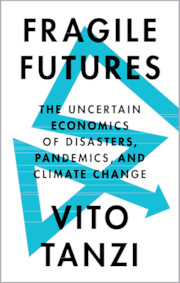Book contents
- Fragile Futures
- Fragile Futures
- Copyright page
- Contents
- Acknowledgments
- Epigraph
- Part I Uncertain Future Events and Reactions to Them
- Part II Pandemics and Other Disasters
- 5 Pandemics, Plagues, and Epidemics
- 6 Famines
- 7 Natural Disasters
- 8 Atomic Disasters
- 9 Industrial Disasters
- 10 Guiding Economic Principles for Disasters
- Part III Climate Change and Global Warming
- Part IV Back to Some Theoretical Issues
- References
- Index
8 - Atomic Disasters
from Part II - Pandemics and Other Disasters
Published online by Cambridge University Press: 28 April 2022
- Fragile Futures
- Fragile Futures
- Copyright page
- Contents
- Acknowledgments
- Epigraph
- Part I Uncertain Future Events and Reactions to Them
- Part II Pandemics and Other Disasters
- 5 Pandemics, Plagues, and Epidemics
- 6 Famines
- 7 Natural Disasters
- 8 Atomic Disasters
- 9 Industrial Disasters
- 10 Guiding Economic Principles for Disasters
- Part III Climate Change and Global Warming
- Part IV Back to Some Theoretical Issues
- References
- Index
Summary
Description: Research on the atom, in the 1950s, brought the possibility of generating the energy that humans increasingly needed from the splitting of the atom. Atomic plants started coming into existence in the Soviet Union, the USA, the UK, France, Japan, and many other countries. Their low cost was a major attraction. Uranium was readily available, even though the plants were expensive to build. As in many industrial plants, there were some accidents that had to be reported to a UN agency. They were generally minor.<break>In later years, three such accidents could no longer be considered minor in their potential, and two were clearly major in their impact. The three accidents were: at Three Mile Island, Pennsylvania, USA; at Chernobyl, Ukraine; and at Fukushima, Japan. The reasons for each of the accidents was different. These accidents threatened or created a meltdown of the atomic core. The accidents in Ukraine and at Fukushima caused many deaths and did enormous damage. They alerted the world to the potential, existential danger of this cheap energy source and reduced enthusiasm for it. Supporters of atomic energy have continued to stress that in spite of the accidents, atomic energy remains an available and relatively clean energy source.
Information
- Type
- Chapter
- Information
- Fragile FuturesThe Uncertain Economics of Disasters, Pandemics, and Climate Change, pp. 90 - 118Publisher: Cambridge University PressPrint publication year: 2022
